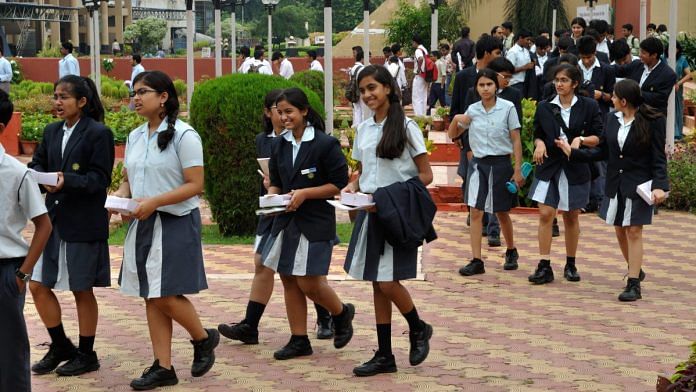New Delhi: Mandatory masks, regular sanitisation of hands and only 12 students per room — these are some of the guidelines that the Central Board of Secondary Education (CBSE) plans to follow to conduct the remaining Class 10 and 12 board exams amid the coronavirus pandemic.
The board exams for some subjects of class 10 and 12 had to be postponed in March after an increase in Covid-19 cases across the country. The remaining exams will now be held in the first two weeks of July.
CBSE also plans to direct all centres and schools to sanitise the examination halls twice — before and after the exams.
Detailed guidelines are being prepared to reduce the risk of Covid-19 in examination halls. This becomes especially crucial in the wake of several warnings from experts that the number of infections in India are likely to peak in June and July.
“Examination centres will be asked to make sure that 12 students are sitting in an exam hall meant for 24 students, which is the norm according to the board’s guidelines. By halving the number of students in a room, we will make sure that social distancing is maintained,” CBSE Exam Controller Sanyam Bhardwaj told ThePrint.
Bhardwaj added that distance between students will also be ensured while entering the hall and sanitisers will be made available in every exam hall.
He also said that it will not be compulsory to wear gloves since it may be difficult for students to write with gloves on, instead they should sanitise their hands regularly.
“We are going through all the guidelines by the health ministry and WHO and will make sure that all measures are strictly followed in exam halls,” said Bhardwaj.
Also read: CBSE to conduct remaining Class 10 and 12 board exams from 1-15 July
20-hour gaps, no thermal screening in exam halls
CBSE will also ensure that there is a gap of at least 20 hours between two exams in a particular centre, to ensure that the halls are properly sanitised.
According to Bhardwaj, all the centres and schools have been asked to sanitise the premise properly before every exam. “We are making sure that there is a gap of at least 20 hours between when the last person leaves an exam hall and the first person comes in the next day. The time table for exams will also have to be prepared keeping in mind these things,” he said.
The board, however, does not plan to conduct thermal screening or temperature screening at exam halls, saying that it’s not feasible to do so.
A senior CBSE official said, “Installing thermal body scanners in each exam centre is impossible because a machine costs a lot of money. Besides, we have spoken to a number of experts and they say that there is no point in checking the temperature, it does not indicate anything about the infection.”
“Rather, we are considering asking parents to declare in advance if their child has some kind of fever or infection so that we can take due precautions in case of that candidate,” the official added.
The National Testing Agency (NTA), which will conduct Joint Entrance Examination (JEE) for admission to engineering colleges and National Eligibility and Entrance Test (NEET) for medical colleges, will also follow similar social distancing protocols for conducting exams.
JEE exams have been scheduled between 18 July and 23 July, NEET will take place on 26 July.
Also read: No assembly or sports, classes in shifts — the likely new normal in schools after lockdown



